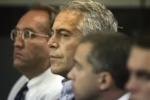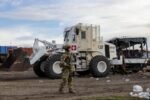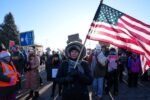The Trump administration is preparing to label the so-called ‘Cartel de los Soles’ as a foreign terrorist organization, escalating its pressure campaign against Venezuelan President Nicolás Maduro. But despite the dramatic designation, the group does not function as a cartel in any structured or traditional sense.
The move, expected Monday, represents the administration’s latest step in what it calls a crackdown on drug trafficking into the United States. Secretary of State Marco Rubio recently accused the Cartel de los Soles of being “responsible for terrorist violence” across the Western Hemisphere.
A Terror Label for an Entity That Isn’t Really a Cartel
The designation comes as President Donald Trump considers potential military action against Venezuela — an option he has not ruled out, even as he has entertained the possibility of direct talks with Maduro.
A U.S. campaign already underway has included:
- A significant military buildup in the Caribbean,
- Strikes on boats allegedly tied to drug trafficking,
- More than 80 people killed in these operations,
- U.S. warships now operating in multiple maritime zones, including near Venezuela and the eastern Pacific.
The term “Cartel de los Soles” emerged in the 1990s to describe high-ranking Venezuelan military officers enriched through drug smuggling. Over time, as corruption spread under Hugo Chávez and then Maduro, the term expanded to include a wide range of officials involved in illegal mining, fuel trafficking, and cross-border narcotics operations.
The “suns” refer to the insignia worn by senior military commanders — a symbolic reminder of who allegedly benefits most from these operations.
Yet experts emphasize that the label is misleading.
“It is not a group,” said Adam Isaacson of the Washington Office on Latin America.
“They don’t have meetings. They don’t have structure. No one calls themselves a member.”
A Radical Expansion of the Terror Designation
Until this year, the foreign terrorist designation was reserved for violent extremist groups such as ISIS or al-Qaida.
But the Trump administration has expanded it to include eight Latin American criminal networks, claiming they pose threats to U.S. national security.
The U.S. argues these groups operate the boats being targeted in American strikes — although it has offered little evidence and frequently avoids naming specific organizations.
Critics, including Maduro, say the military campaign is aimed not at drugs but at ending the ruling party’s 26-year grip on power.
Maduro’s Contested Presidency and Human Rights Abuses
Trump does not recognize Maduro as Venezuela’s president, citing last year’s presidential election — a vote in which officials declared Maduro the winner despite credible evidence showing the opposition had won by more than a 2-to-1 margin.
Maduro’s government has been repeatedly accused of:
- Human rights violations,
- Arbitrary detentions,
- Repression of political opponents,
- Post-election abuses following the disputed 2024 vote.
The U.S. has also been intensifying financial pressure. In July, the Treasury Department imposed sanctions on the Cartel de los Soles, asserting that Maduro’s government, military, and intelligence services actively support narcotics trafficking.
Washington Says the Terror Label Gives New Leverage
Defense Secretary Pete Hegseth said the new designation will offer “a whole bunch of new options” to deal with Maduro, though he declined to confirm whether the U.S. might target land-based facilities inside Venezuela.
A senior U.S. official told the AP that Trump believes Maduro’s rule is “not sustainable” and is carefully listening to intelligence warning that high-level Venezuelan officials are becoming increasingly anxious as U.S. strikes intensify.
Despite frantic attempts by Maduro’s allies to open communication channels with Washington, Trump has authorized no direct or indirect talks.
The Narcoterrorism Case Behind the Designation
The Cartel de los Soles label gained international prominence in 2020, when the U.S. Justice Department indicted Maduro, Diosdado Cabello, Defense Minister Vladimir Padrino López, and others for narcoterrorism.
The indictment alleged they conspired with Colombian guerrillas to:
- Ship tons of cocaine to the United States,
- Use drug trafficking as a weapon against the U.S.,
- Protect smuggling routes along the porous Venezuela-Colombia border.
Although the FARC formally demobilized after the 2016 peace deal, dissidents and the ELN guerrilla continue drug-running, often with the tolerance or cooperation of Venezuelan security forces.
Maduro dismisses the accusations as part of a U.S. plot to justify removing him from office. His government cites a UN report claiming only 5% of Colombian cocaine passes through Venezuela — a statistic heavily disputed by U.S. agencies.
Conclusion: A Political, Military, and Legal Escalation
Monday’s designation represents:
- Washington’s most serious escalation against Maduro since early 2020,
- A step that broadens U.S. authorities to target Venezuelan officials,
- A move that could justify future military, financial, or covert actions,
- And a redefinition of what constitutes a “terrorist organization.”
Whether it will weaken Maduro’s hold on power — or push Venezuela deeper into crisis — remains uncertain.







